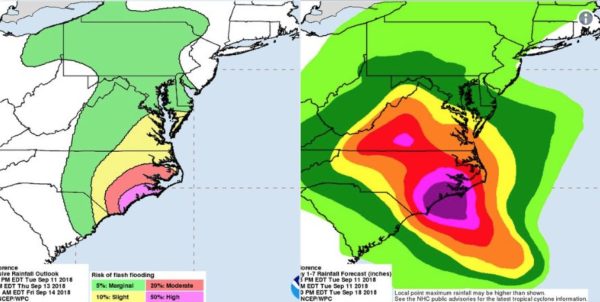Over the past 24 hours, as Hurricane Florence has gotten closer to a predicted landfall on the Carolina coast, the risk of major impacts here in the D.C. area have decreased.
Currently, it appears that rain is the main danger. The 2-4 inches currently predicted could be enough to cause flooding locally, as the region is already waterlogged from well above average rainfall, but is a far cry from the 6-20 inches of rain predicted for large parts of southern and central Virginia.
.@NWSWPC is forecasting a high to moderate risk of flash flooding starting Thursday across most of eastern North Carolina from #Florence. 15-25" with isolated maximum amounts of 35" are possible over portions of North Carolina and Virginia. https://t.co/f4Czb6sTOg pic.twitter.com/kNpMvPfXuj
— National Hurricane Center (@NHC_Atlantic) September 11, 2018
Though it looks like we’ll be spared the brunt of the storm, Arlington’s emergency management department is urging residents to be prepared for the worst nonetheless.
The agency released the following set of hurricane preparedness tips yesterday.
As the Hurricane Florence gets closer, there is an increasing risk of direct impacts to our region. The major concerns with this storm are rainfall amounts and wind speeds. Excessive rain may cause flooding and as the ground becomes more saturated, it will be easier for winds to knock over trees and take down power lines. Be prepared for power outages. Do not report power outages to 9-1-1, unless there is a life-threatening emergency. To report trees or wires down or flooded roadways, you can contact the non-emergency number at 703-558-2222. Remember: do not travel through flooded roadways. Turn around, don’t drown.
The Arlington County Department of Public Safety Communications and Emergency Management is encouraging all residents to prepare now for Hurricane Florence. Do not wait until the day before. Here are some tips to get you and your family ready:
- Be Informed: Stay aware of things going on by having multiple ways to get information and keep an eye on the forecast.
- Log into your Arlington Alert account to update your information and sign up for weather and traffic alerts.
- Follow Ready Arlington on Facebook and Twitter
- Plan Ahead: Make an emergency plan, and discuss it with each family member.
- Plan for possible evacuation.
- Fill your gas tank in your car.
- Have cash on hand. During power outages, ATMs and credit card machine will not work.
- Use text and social media when able to get in touch with family members and plan for what to do if there is no phone service or internet.
- Have names and phone numbers of family members, utilities, doctors/pharmacists, etc written down.
- Prepare your home:
- Clear gutters and downspouts of debris.
- Trim trees and shrubbery.
- Secure or bring inside any outdoor furniture or loose items.
- If you have a generator remember to only run it outdoors.
- Place a thermometer in your fridge and freezer in case of power outages. Any food that has reached 40 degrees or higher should be thrown out. If doors are kept closed, food in the fridge will be kept cold for about 4 hours, and the freezer for about 48 hours.
- Turn off or disconnect appliances. If the power goes out, a momentary power surge can cause damage.
- Move items in your basement off the floor in case of flooding.
- Review your insurance policy.
- Build a Kit: Get supplies together that you may need for your family for at least 3 days. Make sure to include the needs of pets.
- Have food that is nonperishable that does not require power to make.
- Ensure you have flashlights and check batteries. Do not use candles as they can be a fire hazard.
- Keep cell phones charged. Consider an external charger.
- Refill medication/first aid kits.


